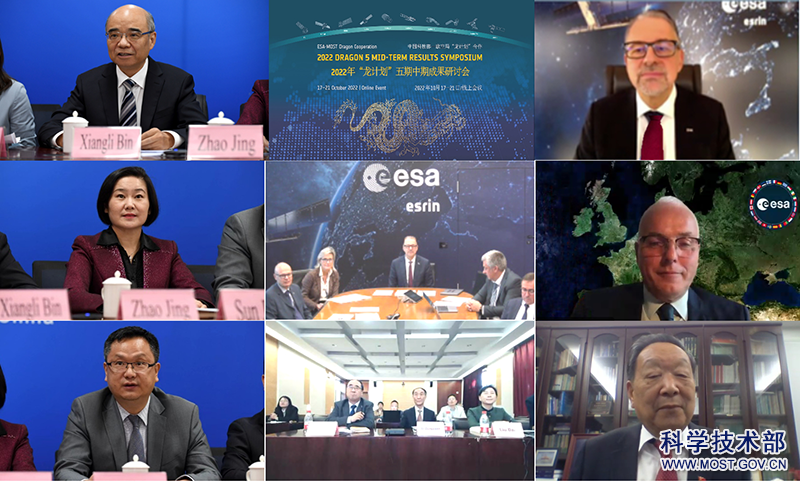MOST-ESA Dragon Programme Achieves Fruitful Results

2022 Dragon 5 mid-term results symposim was held on October 17, Beijing. (PHOTO: MOST)
By Tang Zhexiao
From 16 in Dragon 1 to 55 in Dragon 5, the number of cooperative research projects between China and Europe in Earth Observation (EO) has been continually growing.
As a joint undertaking between European Space Agency (ESA) and China's Ministry of Science and Technology(MOST), the Dragon Programme aims at stimulating bilateral scientific exchange and cooperation in EO science and technology. The National Remote Sensing Center of China (NRSCC) and the European Space Research Institution (ESRIN) of ESA are responsible for the organization and implementation of the programme.
Launched in 2004, the Dragon Programme has received fruitful achievements. Currently, four phases of the Dragon cooperation have been completed, with 120 research projects carried out and nearly 1,200 young scientists trained.
Following eighteen years of cooperation, nearly 2,000 Chinese and European scientists have been working on remote sensing of Solid Earth, Costal Zones & Oceans, Atmosphere, Climate Change, Sustainable Agriculture and Water Resources, among others.
Breakthrough has been made in the key technology of high-precision detection of greenhouse gases such as carbon dioxide and methane, making high-quantitative remote sensing monitoring of greenhouse gas concentrations in a wide range available.
Phase signal analysis for synthetic aperture radar interferometry, a powerful method for obtaining millimeter-accurate surface displacement measurement, has also made its progress. It enables high-precision monitoring of earthquake surface deformation and urban land subsidence.
Dragon Programme has promoted the cultivation of young scientists in remote sensing. Nearly 80 percent of Chinese experts are young and middle-aged scholars under the age of 45.
By organizing cooperative research, courses, abroad short-term training, as well as a series of academic seminars and other activities, a batch of young scientists have enhanced their research ability.
Li Deren, the first Chinese scholar to win the Brock Gold Medal Award, one of the most influential awards in international photogrammetry and remote sensing, said that Dragon Programme for scientific and technological cooperation is unprecedented in terms of cooperation scale, research level and achievements, adding that it has attracted widespread attention from counterparts at home and abroad.
Based on the previous four phases, Dragon 5 has further expanded in terms of research fields, shared satellite data sources, and the number of scientists participated, continuing to focus on in-depth cooperation in EO application research, talent training, academic exchanges and data sharing. Mainly covered in ten fields of EO science, the research regions of the Dragon 5 involve China, Europe, Africa, the Arctic and the Antarctic, etc.
Moreover, shared data resources are getting rich in the latest phase, with 12 kinds of in-orbit satellite data provided by China, including the newly added Jilin-1 satellite, Luojia 1-01 satellite, China-France oceanographic satellite and Zhangheng-1 electromagnetism satellite, and 14 kinds of in-orbit satellite data provided by France side.
In 2020, the first year of Dragon 5, the joint team has published 246 papers, three monographs, six patents, and received six awards, achieving remarkable results.






